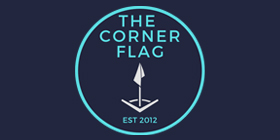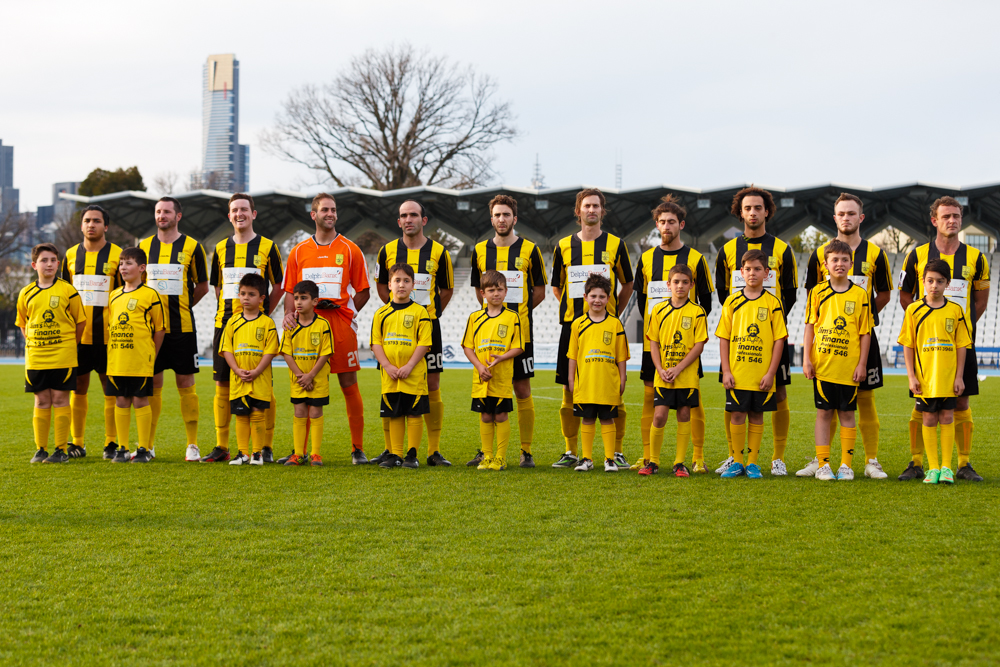“Now that you mention it,” muses South Springvale Aris’s vice-president Omi Emmanouilidis, “I remember back in the day with the old floodlights and pavilion, police were looking for a fugitive in the area – Mad Max they called him – and suddenly a whole bunch of cops came down here with helicopters circling above and shut everything off and told us to get out of the club.”
Pavel ‘Mad Max’ Marinof was a gun-toting burglar who perished in a shootout with police in 1986, a year on the run after wounding a number of officers to avoid arrest. Now almost 30 years later, his devilish memory lives on as I chat with the vice-president about slayings and scandals in sunny Springvale.
The theme of this interview is South Springvale Aris through time – the moments and narratives that have shaped the Warner Reserve club. I was expecting stories of underdog triumphs and rich culture, not foul play. Okay, I totally was. I facilitated this part of the conversation. I grew up in this area and know some of its colourful past.
I sparked Omi’s memory about Mad Max when recalling another incident at a former gun shop near Sandown Park Kindergarten – not far from Warner Reserve – which I attended. In 1993, a year before I started pre-school, gun nut John Lascano strode into the shop, executed the owner, his daughter and her friend, before stealing ammunition and burning down the place. He’s now locked up for a long time.
I apologise if this introduction has shattered your perception of Springvale. I promise these episodes are isolated and long foregone. Though I do deduce that Warner Reserve was historically a terrific juxtaposition of picturesque suburban utopia and petty crime. In the past, the footpath along Mile Creek – flowing along the length of Warner Reserve – was a kid’s gateway to the old playground, a running track for fitness buffs, and a pleasant stroll for parents with prams during the day. At night it was the paved red carpet to the public toilet – a halfway point for drug transfers – often circled by police in the morning.
South Springvale Aris has been the fabric of the area since 1980. “We started in 1968 when people came from Greece, they were just playing as one team, called Sandown Dynamo, in the Amateur League,” Omi recites. “They used to play out of Springvale High School, then moved to Warner Reserve in 1980 after joining the federation, because the amateur league didn’t have a junior base.” The vice-president can testify to the occurrences at Warner Reserve. He’s been omnipresent at the club for over 35 years, starting out as a player at 10-years-old, retiring at 22 due to two knee operations, and occupying the committee thereafter. He claims the early days, with that damned pavilion, were sometimes difficult.
“With the old style pavilion, we had women playing and we couldn’t even accommodate them to get changed without telling the boys to get out,” Omi laughs. “There were also weekends where parents would have to come early to clean up used syringes. We also had a number of pennants and trophies stolen and destroyed- to replace them all would have cost thousands of dollars.”
It’s something I can relate to. I play tennis at Springvale North, almost next door to South Springvale Aris, which is a weird geographical divide when you consider that Springvale South Tennis Club is kilometres away near Keysborough. Our clubhouse was also once broken into, with flags and honors boards stolen, burnt down, and dumped in Mile Creek.
But times have changed at Warner Reserve. Police presence is less frequent nowadays. There’s a new family friendly playground further away from the toilet. More trees line the reserve. Call it a gentrification of sorts, a maturation.
And Aris has transformed with the area. The lousy pavilion is gone, replaced with a council funded $3.5 million modern clubhouse fully equipped with canteen, change rooms and function room. The community retains its proud Greek heritage, while accommodating a hotpot of assorted nationalities and cultures. “Springvale has changed a lot- when our parents were first here there were a lot of Greeks, Italians, Turkish, Yugoslavians. It is predominantly Vietnamese now, and you also see Sudanese, Somalians move into the area,” Omi explains.
“We tried to accommodate the Vietnamese when they came. Our parents came here as immigrants [from Greece] as well and they found it tough, so it was in the club’s best interests to then support [the Vietnamese]. It was hard for them and they stuck mostly to their culture. We had organised through council, when we weren’t playing here on Sunday, we would let them use the oval to play in the Vietnamese competition. But that only lasted for about two years due to running costs, at the end of the day council’s still going to charge.”
“But we did attract some of their players to come and play for us, which was good, but eventually everyone moves on. We also had a few good Somalian kids but they ended up moving onto bigger clubs, because we were stuck in State League Two and they got opportunities in the old Victorian Premier League.”
This where I discover the club’s absolute pride to nurture youth in the hopes of seeing them flourish and grow out of the club’s boots to play at a higher level.
“It is an honor for us to have anyone that is good enough move on from this club and go higher. We encourage it,” Omi declares.
“We’ve had past players that have worn the Australian jumper. This goes back many years, I wasn’t even born, but Theo Selemidis – who played for Heidelberg and Melbourne Knights in the National League – wore the Australian top and he actually came through here with his brothers, in the Amateur League. He was just a young kid, kicking the ball, went to another club because the amateur league didn’t have juniors and slowly, slowly, his career took off. But he always says he played his first football at Sandown Dynamo.”
But for every child and family that graces the notoriously choppy summer pitch at Aris, they still absorb that Greek spirit that emanates through the club.
“The nickname Aris is in respect to the people that built this club,” the vice-president exclaims. “We keep this tradition, and when people come, they enjoy adopting it. When the kids win a game they sing the club song which is mainly “Aris Ole, Aris Ole, Aris Ole”. We have family fun nights, it’s mixed music and a lot of people here, non-Greeks, they prefer the Greek music – the Zorba and things like that.”
And the club was certainly singing the song loudly this season, with a whirlwind run in both Cup competitions.
“We entered the Dockerty Cup not knowing the FFA Cup was going to go ahead, just to get pre-season games. Then we heard this could lead you to the FFA Cup, and when we knocked off [NPL club] Pascoe Vale, we thought, “Wow, lets take this more seriously”. Our aim was to win the Championship, but the further we got in the Cup we thought, “We can do this”, and when we beat Hume City and we knew we were one game from the FFA Cup, that was the point of no return.”
“After the Dockerty Cup final against the Knights, to only lose 1-0 in the last minute to the powerhouses of Victorian football, others were gutted but I thought what we’ve done this year is just fabulous. I was honestly a bit happy we didn’t go to penalties because if we lost, the poor bugger that missed the penalty would be haunted for the rest of his life.”
But it’s not like South Springvale aren’t used to the underdog tag. In fact, there’s a decades old legend at the club of a triumph against all the odds. “In 1994 we were in the State League Cup that didn’t include the Premier League clubs, but had State Leagues One to Four. At the end of the season the top four teams from each league would compete in the Cup. We came fourth in State League Four and ended up winning the State League Cup. That was the biggest highlight of the club till now, and that was 20 years ago.”
20 years is a long time in between drinks. But there was something in the Mile Creek waters this year to spark and sustain Springvale’s miracle Cup run, and it wasn’t the stuff coming in and out of the infamous public toilet. Omi attributes it to a tight-knit spirit between the players and staff at the club, a lifelong bond, a perfect marriage.
“It’s all about wanting to play for the jumper. We’re a small family club, we rely on our canteen. The past players are sponsors of the club, and the players we have here love this club, they don’t want to move on, and hopefully when they retire, they will take on coaching or committee roles, and they can support us in some role.
“All our juniors now see our seniors as heroes and we keep telling them that one day- it took us 20 years to make a final- you guys are the next generation, so maybe in the next 10-20 years, we can see them play in a final of some sort.”
I can attest to this Warner Reserve spirit. I won 10 local competition titles at Springvale North. No biggie. I put it down to the magic of the Reserve, a place where people can enjoy the serenity away from the hustle and bustle of the city-centre. A place where you actually want to play and look forward to catching up with teammates. Aris know they represent the area, and in true community club spirit, stay loyal to providing an accessible pathway for kids to realise their potential and adults to enjoy the sport in a neighbourly environment.
“We’re on the map, which is good, but I also think we represent all the community clubs. If we can do it, we hope that another community club can do it as well. The NPL isn’t the only pathway.”
“I think with the NPL there are serious conditions, clubs that charge juniors upwards of a thousand dollars to play football is wrong. You’d rather have the kids play, and if they’re good enough they’ll get picked up. Kids should be playing without a price tag, and I believe the NPL’s got a price tag on it.
“Theres so many more club these days, people have moved to different areas, and you don’t always get a large number of kids. Any kid that wants to play football, were happy to have, no matter what nationality, what religion they are. It’s an open house as long as they want to play football.”
I wrap up the interview and bid Omi farewell. I know a bit more about my sporting neighbours now, a transformation from a collective of Greek immigrants to a United Nations of cultures, with many curious occurrences along the way. Now every time I play tennis down the road, I appreciate just a little bit more the profound influence the weird and wacky, but also fairly workaday Warner Reserve has had on my world.

